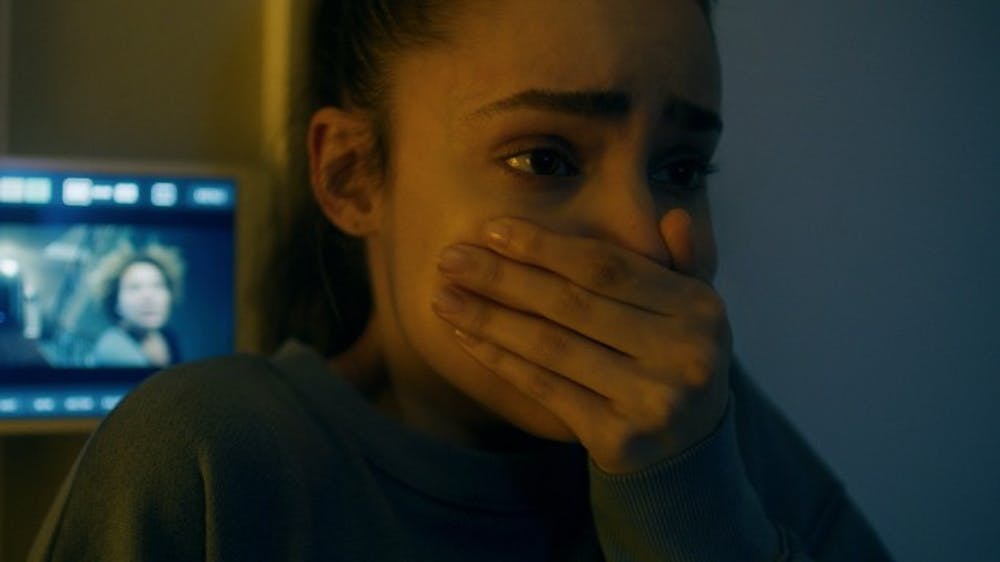The opening sequence of the Michael Bay–produced Songbird was perhaps the best part: a cacophony of radio dispatches and news anchor commentary as we’re flashed aerial shots of an abandoned city à la I Am Legend, except set in Los Angeles instead of New York. “New strand, new year!” says a voice seeped in cynicism. “Remember the good old days of fake news? Real news is worse,” says a talking head in a mocking tone. It’s a clever introduction, but from there, it’s all downhill.
Songbird takes us into a botched near–future fiction where COVID–19 has mutated into the more contagious and much deadlier COVID–23. All except the immune are confined to their homes. Temperature checks are required every morning. If you fail, you’re forced into the dreaded “Q–Zone,'' which is practically a death sentence. While the trailer showed promise upon its October release, Songbird itself was wholly disappointing: The character development is sparse, the plot thin, and the premise stale and clichéd. Capitalizing on quarantine anxiety, the notoriety of its cast, and the boastful intrigue of being the first feature–length film to shoot in Los Angeles amid the pandemic, Songbird is at its best gimmicky and at its worst deeply exploitative of the trauma of COVID–19.
Songbird is a wannabe pandemic thriller in the likeness of The Happening, 28 Days Later, and Contagion; the result is a rushed and sickeningly predictable attempt at COVID–19 commentary. Songbird’s world has descended into a sanitation department–ruled martial law that’s far from our present reality—though the movie makes no attempt to give any further detail about how exactly things became so severe and corrupt. This, perhaps, is the most anxiety–inducing thing about the film: It never actually explains the context of the diseased dystopia it attempts to depict. Though there are vague allusions to political corruption, rampant mutation, and societal apathy, the audience is left to guess how the situation came to be. Is the ambiguity a form of commentary on the uncertainty of our present world? Maybe, but that sentiment is too shrouded in bad dialogue and confusing plot points to be palpable.
Sure, bad movies are released all the time. For a film with so much hype, the final product is particularly disappointing. When so much is still uncertain, it’s too soon to create some fictional narrative of a near future pseudo–apocalypse when real–world grief and trauma still feel world–shattering. We still don’t know if the vaccine will be effective against new COVID–19 mutations, if our economy will bounce back, or if our healthcare system will endure. With daily symptom checks just to enter buildings at Penn, empty streets, and vaccine gatekeeping—isn’t this world already dystopian enough? The last thing we want is a movie essentially telling us, “It could be worse.”
And it’s not just Songbird that’s failing to deliver with its pandemic production; other big–budget pandemic content is falling just as flat. Other projects both shot and set in the pandemic are hardly streaming success stories. HBO Max’s Locked Down led by Anne Hathaway and Chiwetel Ejiofor has received only modest reviews. Though Black Mirror’s creators acknowledged it wasn’t appropriate timing to release a new season of the anthology horror series, their alternative star–studded political satire Death to 2020 was unfunny and bland. Even Saturday Night Live’s pandemic–themed sketches have been lackluster; there was even something more wholesome when SNL was operating remotely from the homes of its cast.
In fact, it’s that type of home–produced pandemic content that has actually been the most successful in the past year. Candid pandemic humor from TikTokers is better than most of the attempts at large–production content made since March 2020. Reality TV is a sweet escape. Or take Host, Shudder’s low–budget pandemic–era horror flick of a séance among friends gone wrong, told entirely through the lens of a quarantine Zoom meeting. It’s timely without treading into the depths of commentary, carefully capturing the Zoom–defined era without making light of existing trauma.
Sure, topical content generates buzz, but it’s far from what we want right now—and nearly impossible to do tastefully when our collective trauma is still unfolding. We get enough of the pandemic angst on our news feeds—no one’s asking for it to be packaged and dramatized for entertainment. No, we want distraction and escapism, the sort of thing brought to us by The Bachelorette, Bridgerton, The Office reruns, and Taylor Swift documentaries. Or better yet, unbothered commentary from small creators on our “For You” pages.
There will be a time when good film and television will emerge with art, narrative, and discourse to make sense of this horrific era in world history. There will be a time for telling true stories of families and first responders, for rom–coms about failing couples who met over Zoom, and, yes, even for imaginings of dystopian worlds where the pandemic was much, much worse. But that time is not now.
Hollywood, may this message be clear: Let the trauma of the pandemic come to an end before you begin to exploit it.







